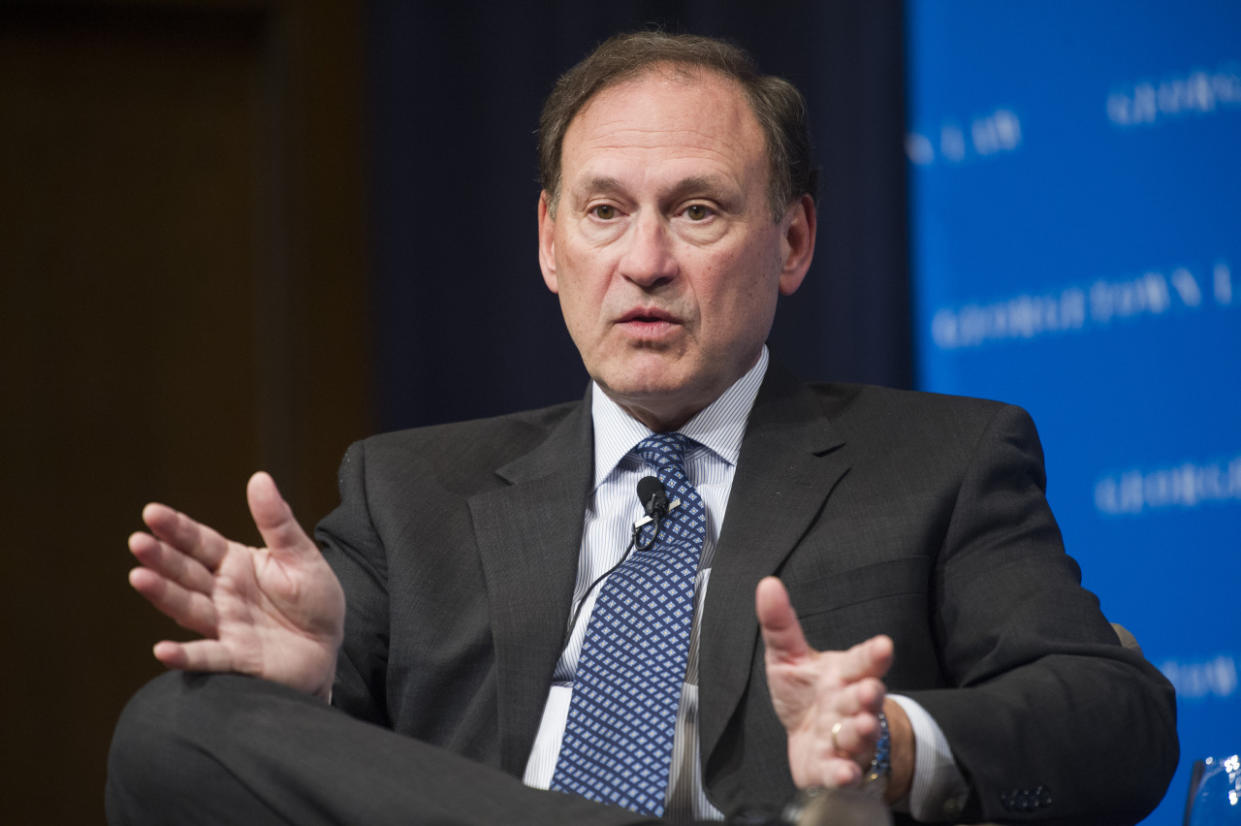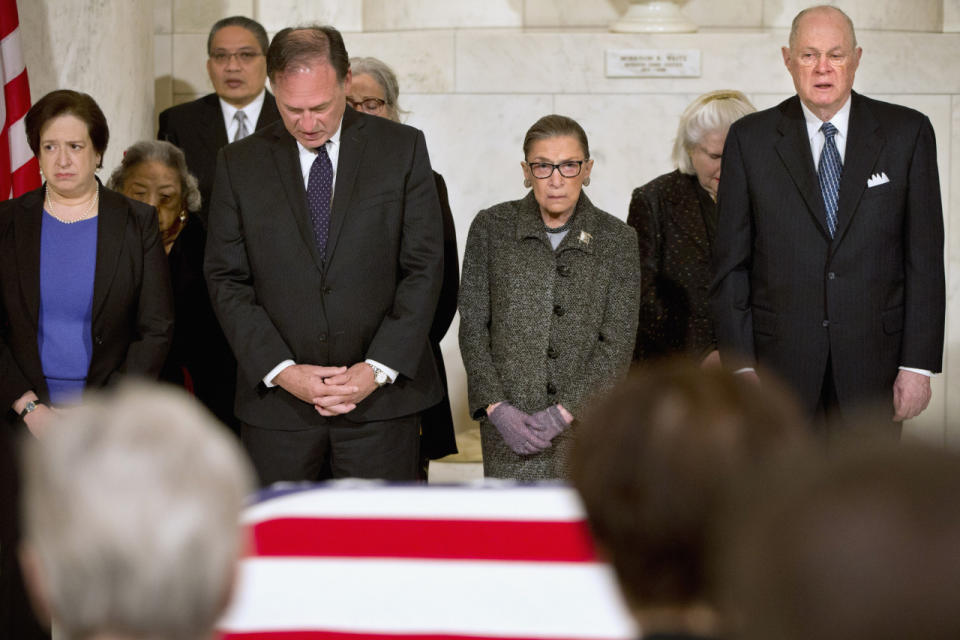Will Alito replace Scalia as the Supreme Court’s most stinging questioner?

Supreme Court Justice Samuel Alito (Photo: Cliff Owen/AP)
U.S. Solicitor General Donald Verrilli appeared to be momentarily flustered last month as he argued the Obama administration’s case before the Supreme Court that religiously affiliated nonprofits’ health care plans must include birth control.
Justice Samuel Alito cornered Verrilli on a potential hole in his case. The Obama administration had grandfathered a quarter of all health care plans out of the birth control requirement, raising doubts about whether the government really believed access to birth control was a goal crucial enough to infringe upon the religious beliefs of employers.
Verrilli said that the number of grandfathered plans was dropping every year. “We’ll be at zero very soon,” he said.
“But, you know, in the long run, we’re all dead,” Alito shot back, as the audience in the courtroom laughed. “But what’s going to happen in the interim?”
A few months earlier, Alito’s pointed remark easily could have been made by Justice Antonin Scalia instead. Scalia, who died in February, was known as a biting conservative firebrand, but his reputation was perhaps most fearsome in the domain of the oral argument. The late justice could get under the skin of even the most cool and collected attorneys with his clever, and often aggressive, questions. Scalia’s death has left a rhetorical void in the court’s most public setting, which, it appears, 66-year-old Alito is attempting to fill more than any of the court’s other conservatives.
Adam Feldman, a lawyer who runs a website called Empirical SCOTUS, analyzed the text from the final 16 oral arguments before Scalia’s death and the 16 that have come since the legal giant died. He found that in the 16 oral arguments before his death, Scalia spoke up more than any other justice, inserting himself into the conversation more than any of his colleagues. (When it comes to total words spoken, however, Justice Stephen Breyer topped the court, speaking 5,569 more words than the next most talkative member of the court, Justice Elena Kagan.) In the last 16 oral arguments, every justice except Anthony Kennedy and Breyer said more words than they had when Scalia was alive. On the liberal side, Kagan added to her speaking time the most, by about 2,500 words. On the conservative side, Alito stepped up the most, speaking 1,500 words more in his colleague’s absence. (The poor attorneys, however, did not get to talk any more than they used to in arguing their cases.)
Alito’s transformation isn’t just that he’s talking more — he’s using his increased speaking time to ask more questions. Since Scalia died, about 50 percent of Alito’s sentences have been questions, compared with only 34 percent before. That means Alito is using his time to ask questions more than any other justice on the bench. The other justices use more of their time to interrupt the lawyers to make their own points instead of asking them to explain their positions.
“It’s such an anomaly among the justices,” Feldman said of Alito’s inquisitive style. “They like to hear themselves talk.”
Alito isn’t the only one who has spoken up since Scalia’s passing. During an oral argument shortly after his friend’s death, Justice Clarence Thomas asked a question for the first time in a decade, stunning the courtroom. Thomas has long said he believes the justices yammer on too long during arguments, which is why he has kept a stony silence. But Scalia’s absence clearly triggered a change of heart for the justice. “While Justice Thomas is unlikely to speak in every case, or even a majority of cases, because of his philosophy about oral argument, I would not be surprised if the time between speaking becomes much shorter now,” said James Phillips, a legal scholar at the University of California, Berkeley.
SLIDESHOW – Services for Justice Scalia >>>

Supreme Court justices, from left, Elena Kagan, Samuel Alito, Ruth Bader Ginsburg, and Anthony Kennedy at a private ceremony on Feb. 19 in the Great Hall of the Supreme Court, where Justice Antonin Scalia lay in repose. (AP/Jacquelyn Martin, Pool)
Though Alito appears to be filling Scalia’s absence more than any of his fellow conservatives, it’s unlikely that any of the remaining justices will ever be as provocative as Scalia was. Just a few months before his death, Scalia set off controversy when he asked in an affirmative action case whether it might be a bad thing for the University of Texas to “to admit as many blacks as possible.” This was typical of his bomb-throwing style.
“I think [Alito will] be asking the types of questions that Scalia might have asked from an ideological standpoint, but there’s nobody on the court right now who’s going to be as outspoken as Scalia was,” Feldman said.
Scalia transformed the oral argument when he took the bench in 1986, from a sedate, hourlong event in which dueling attorneys presented their cases with little interruption from the Supreme Court to a spirited debate, with multiple justices interrupting the attorneys — and each other — with biting questions.
Scalia’s stinging questions, often tinged with acerbic wit, were widely feared among attorneys. A couple of high-powered lawyers preparing for a case on Guantánamo Bay hired a litigation coach who helped them to imagine Scalia in a bunny suit or getting hit with a cream pie to help them feel less intimidated by him.
Tony Mauro, a reporter for National Law Journal who has covered the Supreme Court for more than 30 years, recalls when Scalia interrupted an attorney in the 1980s.
“Scalia asked a question, and the poor lawyer hesitated too long in answering and Scalia said, ‘Counselor, you have four choices. Yes, no, I don’t know or I’m not telling. Which is it?’ I think I would have fainted at that point,” Mauro said. “He could really shake things up.”
Mauro thinks Alito is now “trying to ask questions that Scalia would have asked.” But the “over-the-top” and sometimes even obnoxious questions that Scalia would throw out have not reappeared and may never do so. “It’s a little less interesting,” Mauro said of the oral arguments.


